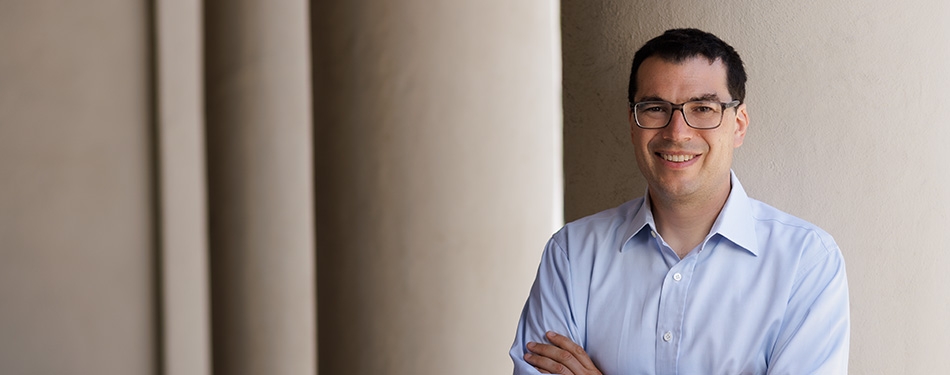Historian and legal scholar Sam Erman brings race and citizenship-focused research to Michigan Law.
Sam Erman, ’07, a leading scholar of law and history pertaining to citizenship, the Constitution, empire, race, and legal change, has returned to his alma mater as a professor of law.
Erman offers two stories behind how he found this field of study.
The first, he said, is the more “scholarly” version: While earning his PhD at U-M in American culture, he wanted to answer the question, “How do modestly situated people that you might not think of as legal actors end up having an impact on the history of law?”
Studying citizenship, he decided, was one way of answering that question. From there, he began to focus on the early 20th century and the struggles of Puerto Ricans trying to gain U.S. citizenship.
The “more autobiographical” version, conceded Erman—who spent nearly a decade as a professor of law at the University of Southern California—was he “became fascinated with Isabel Gonzalez.”
With international law on the rise, some [countries] felt pressure to try to find a universal language to capture [jus sanguinis] rules. That is when all four countries stopped thinking of themselves as being quite unique, to thinking of themselves as all being on the same grid.
During a graduate school course of race and citizenship in Cuba, Erman researched a 1904 Supreme Court citizenship case involving a 19-year-old Puerto Rican woman (Gonzalez), who was denied entry into the U.S. when she arrived in New York on the basis that she was an undesirable “alien” immigrant.
“I wanted to learn everything about her situation and her experience, but that was hard,” said Erman. “My broader project emerged as I initially solved other puzzles around her instead.”
Exploring birthright nationality and the relationship between citizenship and empire
Those years of research resulted in the book, Almost Citizens: Puerto Rico, the U.S. Constitution, and Empire (Cambridge University Press, 2018). The book outlines how Gonzalez’s activism called into question the relationship between American citizenship and empire in the years following the U.S. acquisition of territories.
“She was this woman with really hard economic circumstances who was also highly educated and sophisticated,” Erman said of the Gonzalez, whose fight caused a fundamental shift in constitutional jurisprudence: away from the post-Civil War regime of citizenship, rights, and statehood and toward doctrines that accommodated racist imperial governance.
Erman’s research into citizenship has led him to a collaborative project on the history of birthright nationality in England, France, the United States, and later Spain, specifically the “jus sanguinis” rule that you are a citizen of the place where you are born.
That rule predated the 14th Amendment. He and his partner Nathan Perl-Rosenthal realized that this seemingly ancient rule was actually invented in the mid-19th century.
“It seems lots of countries had their own rules, and then, with international law on the rise, some felt pressure to try to find a universal language to capture all these countries’ rules,” explained Erman. “That is when all four countries stopped thinking of themselves as being quite unique, to thinking of themselves as all being on the same grid.”
Applying social psychology principles to new lawyers
Beyond being a scholar of citizenship, Erman is also studying his own profession.
Currently, he is part of a research team seeking to use insights from social psychology to help those entering the legal profession.
“The basic idea is that with very light touches, you can provide people a way of thinking about their experiences that helps them mitigate psychological friction that they may face,” he said.
As an example, he cites letting students studying for the bar exam know that stress can be good (it can help you perform better) and offering positive thoughts (passing the exam is about the bigger purpose of becoming a lawyer).
“What we discovered is that providing people the right suite of information at the right moment can help them study for and pass the bar exam.”
As a former clerk to not one, but two, Supreme Court Justices (John Paul Stevens and Anthony Kennedy), Erman said he is looking forward to teaching constitutional law at U-M, critical race theory this fall, and a new course with Professor Bill Novak.
For Erman, coming to Michigan Law is also coming home.
Beyond graduate school, he was born and raised in Ann Arbor, where his parents still live. But it was Michigan Law that drew him back.
“It is just an incredibly intellectually rich environment with a long reputation for excellence in legal history. It has a tradition of interdisciplinarity, of allowing people to benefit from working together within and across units,” he said. “Not every institution is set up that way. This one is, and that is part of why it is one of the top law schools in the country.”
—Jennifer Conlin

